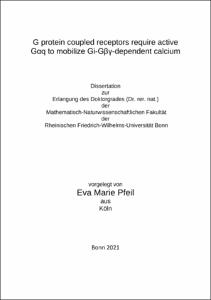Pfeil, Eva Marie: G protein coupled receptors require active Gαq to mobilize Gi-Gβγ-dependent calcium. - Bonn, 2021. - Dissertation, Rheinische Friedrich-Wilhelms-Universität Bonn.
Online-Ausgabe in bonndoc: https://nbn-resolving.org/urn:nbn:de:hbz:5-62737
Online-Ausgabe in bonndoc: https://nbn-resolving.org/urn:nbn:de:hbz:5-62737
@phdthesis{handle:20.500.11811/9177,
urn: https://nbn-resolving.org/urn:nbn:de:hbz:5-62737,
author = {{Eva Marie Pfeil}},
title = {G protein coupled receptors require active Gαq to mobilize Gi-Gβγ-dependent calcium},
school = {Rheinische Friedrich-Wilhelms-Universität Bonn},
year = 2021,
month = jun,
note = {The mechanisms by which GPCRs drive calcium mobilization in living cells have been a topic of intense research interest for many years. One such mechanism is the paradigmatic Gi-calcium pathway, which describes how Gβγ subunits released from heterotrimeric Gi proteins upon stimulation of a Gi-coupled GPCR can bind and activate PLCβ2 and PLCβ3. These enzymes of the PLCβ family then hydrolyze PIP2 into DAG, which regulates a number of cellular effectors, and IP3, which triggers the release of calcium from the cellular stores via IP3-sensitive ion channels.
Despite the apparent clarity of this well-described Gi-Gβγ-PLCβ-calcium pathway, Gi-GPCR calcium is highly variable across cell types, and difficult to generate under most circumstances. Intriguingly, although Gi-Gβγ-PLCβ-calcium is widely accepted as a ‘stand-alone’ independent signaling module, a number of studies indicate that the canonical Gq-GPCR pathway, which also activates PLCβ to trigger calcium release, might affect or even control Gi-Gβγ-PLCβ-calcium.
Here we investigate a possible dependency of Gi-Gβγ-PLCβ-calcium on the Gq pathway, with the goal of determining why Gi-Gβγ-PLCβ-calcium is variable and difficult to generate. Using a set of recently discovered, cutting edge tools including CRISPR/Cas9-edited cell lines lacking Gαq expression and the Gq inhibitor FR, we show that Gi-Gβγ-PLCβ-calcium is fully dependent on, and only occurs in the presence of, active Gαq. We find that other, PLCβ-independent Gi signaling pathways do not share this requirement for active Gαq. While the downstream consequences of Gαq-activation do not suffice to restore Gi-Gβγ-PLCβ-calcium, removal of the auto-inhibitory domains of PLCβ enables activation by Gi-Gβγ that suffices to mobilize calcium without Gαq. Based on this, we argue that Gαq controls Gi-Gβγ-PLCβ-calcium by relieving the auto-inhibition of PLCβ. It thereby allows sufficient activation by Gi-Gβγ to achieve the acute production of IP3 required for calcium mobilization. Finally, we demonstrate that the necessity of active Gαq for Gi-Gβγ-PLCβ-calcium is conserved across a wide variety of physiologically relevant cell types and influences calcium-dependent cellular functions, such as the aggregation of platelets. Our proposed molecular mechanism provides the missing link to explain the variability of Gi-Gβγ-PLCβ-calcium, and thereby fundamentally contributes to our understanding of how Gi-GPCRs signal.},
url = {https://hdl.handle.net/20.500.11811/9177}
}
urn: https://nbn-resolving.org/urn:nbn:de:hbz:5-62737,
author = {{Eva Marie Pfeil}},
title = {G protein coupled receptors require active Gαq to mobilize Gi-Gβγ-dependent calcium},
school = {Rheinische Friedrich-Wilhelms-Universität Bonn},
year = 2021,
month = jun,
note = {The mechanisms by which GPCRs drive calcium mobilization in living cells have been a topic of intense research interest for many years. One such mechanism is the paradigmatic Gi-calcium pathway, which describes how Gβγ subunits released from heterotrimeric Gi proteins upon stimulation of a Gi-coupled GPCR can bind and activate PLCβ2 and PLCβ3. These enzymes of the PLCβ family then hydrolyze PIP2 into DAG, which regulates a number of cellular effectors, and IP3, which triggers the release of calcium from the cellular stores via IP3-sensitive ion channels.
Despite the apparent clarity of this well-described Gi-Gβγ-PLCβ-calcium pathway, Gi-GPCR calcium is highly variable across cell types, and difficult to generate under most circumstances. Intriguingly, although Gi-Gβγ-PLCβ-calcium is widely accepted as a ‘stand-alone’ independent signaling module, a number of studies indicate that the canonical Gq-GPCR pathway, which also activates PLCβ to trigger calcium release, might affect or even control Gi-Gβγ-PLCβ-calcium.
Here we investigate a possible dependency of Gi-Gβγ-PLCβ-calcium on the Gq pathway, with the goal of determining why Gi-Gβγ-PLCβ-calcium is variable and difficult to generate. Using a set of recently discovered, cutting edge tools including CRISPR/Cas9-edited cell lines lacking Gαq expression and the Gq inhibitor FR, we show that Gi-Gβγ-PLCβ-calcium is fully dependent on, and only occurs in the presence of, active Gαq. We find that other, PLCβ-independent Gi signaling pathways do not share this requirement for active Gαq. While the downstream consequences of Gαq-activation do not suffice to restore Gi-Gβγ-PLCβ-calcium, removal of the auto-inhibitory domains of PLCβ enables activation by Gi-Gβγ that suffices to mobilize calcium without Gαq. Based on this, we argue that Gαq controls Gi-Gβγ-PLCβ-calcium by relieving the auto-inhibition of PLCβ. It thereby allows sufficient activation by Gi-Gβγ to achieve the acute production of IP3 required for calcium mobilization. Finally, we demonstrate that the necessity of active Gαq for Gi-Gβγ-PLCβ-calcium is conserved across a wide variety of physiologically relevant cell types and influences calcium-dependent cellular functions, such as the aggregation of platelets. Our proposed molecular mechanism provides the missing link to explain the variability of Gi-Gβγ-PLCβ-calcium, and thereby fundamentally contributes to our understanding of how Gi-GPCRs signal.},
url = {https://hdl.handle.net/20.500.11811/9177}
}






